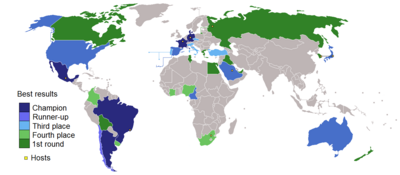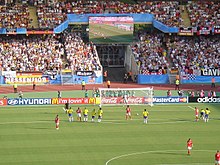FIFA Confederations Cup
FIFA Confederations Cup
Jump to navigation
Jump to search
 | |
| Founded | 1992 |
|---|---|
| Abolished | 2019 |
| Region | International (FIFA) |
| Number of teams | 8 (from 6 confederations) |
| Last champions | |
| Most successful team(s) | |
| Website | Official website |
The FIFA Confederations Cup was an international association football tournament for men's national teams, held every four years by FIFA. It was contested by the holders of each of the six (AFC, CAF, CONCACAF, CONMEBOL, OFC and UEFA) continental championships, along with the current FIFA World Cup holder and the host nation, to bring the number of teams up to eight.
Between 2005 and 2017, the tournament was held in the nation that would host the next World Cup, acting as a test event for the larger tournament.
The last champions were Germany, who won the 2017 FIFA Confederations Cup by defeating Chile 1–0 in the final to win their first title.
In March 2019, FIFA confirmed that the tournament would no longer be active owing to an expansion of the FIFA Club World Cup in 2021.[1]
Contents
1 History and details
1.1 2021 tournament and abolishment
2 Format
3 Results
3.1 FIFA Confederations Cup
3.2 Teams reaching the top four
4 Records and statistics
5 References
6 External links
History and details[edit]

A FIFA Confederations Cup choropleth map showing countries' best results (colours as shown) and host countries (yellow dots).
The tournament was originally organized by and held in Saudi Arabia and called the King Fahd Cup (Confederations Winners Cup or Intercontinental Championship), contested in 1992 and 1995 by the Saudi national side and some continental champions. In 1997, FIFA took over the organization of the tournament, named it the FIFA Confederations Cup and staged the competition every two years.[2]
After 2005, it was held every four years, in the year prior to each World Cup in the host country of the forthcoming World Cup (the 2001 edition was hosted in South Korea and Japan, before the quadrennial pattern was established). Considered a dress-rehearsal for the World Cup it precedes, it used around half of the stadiums intended for use at the following year's competition and gave the host nation, which qualified for that tournament automatically, experience at a high level of competition during two years of otherwise friendlies. At the same time, participation was made optional for the South American and European champions.[3]

Germany against Brazil in the Frankenstadion in Nuremberg, Germany in the 2005 FIFA Confederations Cup
Generally, the host nation, the World Cup holders, and the six continental champions qualifed for the competition. In those cases where a team meets more than one of the qualification criteria (such as the 2001 tournament where France qualified as the World Cup champions and European champions), another team was invited to participate, often the runner-up in a competition that the extra-qualified team won.[citation needed]
On four occasions teams have chosen not to participate in the tournament. Germany did so twice, in 1997 (replaced by Euro 1996 runners-up Czech Republic) and in 2003 when Germany were awarded a place as the 2002 World Cup runners-up, replaced by the third-placed team Turkey. World champions France declined a place in the 1999 Confederations Cup, replaced by Brazil, the 1998 World Cup runners-up. Italy, UEFA Euro 2000 runners up, declined their place in the 2003 FIFA Confederations Cup.[citation needed]
An earlier tournament that invited former World Cup winners, the Mundialito, celebrated the fiftieth anniversary of the first World Cup. The Artemio Franchi Trophy, contested in 1985 and 1993 between the winners of the Copa América and UEFA European Football Championship, was also another example of an earlier contest between football confederations. Both of these are considered by some to be a form of an unofficial precursor to the Confederations Cup, although FIFA recognised only the 1992 tournaments onwards to be Confederations Cup winners.[4]
2021 tournament and abolishment[edit]
The 2021 tournament was originally to be held in Qatar, the host country of the 2022 FIFA World Cup, as announced on 2 December 2010 after the country was awarded the hosting rights of the 2022 FIFA World Cup. However, concerns arose surrounding Qatar's high temperatures during the summer period (which also led to calls for the World Cup to be moved from its traditional June/July scheduling to November/December).[5]
On 25 February 2015, this resulted in FIFA officially announcing that it would move the 2021 Confederations Cup to another country of the Asian Football Confederation, so it could still be held during the traditional window of June/July 2021, without interrupting domestic leagues. As compensation, another FIFA tournament, potentially the 2021 FIFA Club World Cup, could be held in Qatar in November/December 2021, as the test event for the 2022 World Cup.[6][7]
In October 2017, FIFA divulged plans to abolish the Confederations Cup by 2021 and replace it with a quadrennial, twenty-four team FIFA Club World Cup and move the latter tournament from December to June.[8] On 15 March 2019, FIFA announced that the Confederations Cup would be abolished, with the 2021 FIFA Club World Cup taking place instead.[1]
Format[edit]
The eight qualified teams are drawn into two round-robin groups: two teams from the same confederation cannot be drawn in a group, except if there are three teams from the same confederation (something that happened for the first time in the 2017 edition when hosts Russia were joined by World Cup champions Germany and European champions Portugal). Every team plays all other teams in their group once, for a total three matches.
The top two teams of each group advance to the semi-finals, with the winners of each group playing the runners-up of the other group. The rankings of teams in each group are determined as follows (regulations Article 19.6):
- points obtained in all group matches;
- goal difference in all group matches;
- number of goals scored in all group matches;
If two or more teams are equal on the basis of the above three criteria, their rankings are determined as follows:
- points obtained in the group matches between the teams concerned;
- goal difference in the group matches between the teams concerned;
- number of goals scored in the group matches between the teams concerned;
- fair play points
- first yellow card: minus 1 point;
- indirect red card (second yellow card): minus 3 points;
- direct red card: minus 4 points;
- yellow card and direct red card: minus 5 points;
- drawing of lots by the FIFA Organising Committee.
The winners of the semi-finals advanced to the final, while the losers played in the third-place game. For the knockout stage if the score was drawn at the end of regular time, extra time was played (two periods of 15 minutes each) and followed, if necessary, by a penalty shoot-out to determine the winner.
Results[edit]
FIFA Confederations Cup[edit]
The first two editions were in fact the defunct King Fahd Cup. FIFA later recognized them retroactively as Confederations Cup editions.[9]
| # | Year | Host(s) | Number of teams | Final | 3rd place playoff | ||||||
|---|---|---|---|---|---|---|---|---|---|---|---|
| Champions | Score | Runners-up | Third place | Score | Fourth place | ||||||
King Fahd Cup | |||||||||||
| 1 | 1992 Details | 4 | Argentina | 3–1 | Saudi Arabia | United States | 5–2 | Ivory Coast | |||
| 2 | 1995 Details | 6 | Denmark | 2–0 | Argentina | Mexico | 1–1 (a.e.t.) (5–4p) | Nigeria | |||
FIFA Confederations Cup | |||||||||||
| 3 | 1997 Details | 8 | Brazil | 6–0 | Australia | Czech Republic | 1–0 | Uruguay | |||
| 4 | 1999 Details | 8 | Mexico | 4–3 | Brazil | United States | 2–0 | Saudi Arabia | |||
| 5 | 2001 Details | 8 | France | 1–0 | Japan | Australia | 1–0 | Brazil | |||
| 6 | 2003 Details | 8 | France | 1–0 (a.e.t.) | Cameroon | Turkey | 2–1 | Colombia | |||
| 7 | 2005 Details | 8 | Brazil | 4–1 | Argentina | Germany | 4–3 (a.e.t.) | Mexico | |||
| 8 | 2009 Details | 8 | Brazil | 3–2 | United States | Spain | 3–2 (a.e.t.) | South Africa | |||
| 9 | 2013 Details | 8 | Brazil | 3–0 | Spain | Italy | 2–2 (a.e.t.) (3–2p) | Uruguay | |||
| 10 | 2017 Details | 8 | Germany | 1–0 | Chile | Portugal | 2–1 (a.e.t.) | Mexico | |||
Teams reaching the top four[edit]
| Team | Titles | Runners-up | Third Place | Fourth Place |
|---|---|---|---|---|
| 4 (1997, 2005, 2009, 2013*) | 1 (1999) | – | 1 (2001) | |
| 2 (2001, 2003*) | – | – | – | |
| 1 (1992) | 2 (1995, 2005) | – | – | |
| 1 (1999*) | – | 1 (1995) | 2 (2005, 2017) | |
| 1 (2017) | – | 1 (2005*) | – | |
| 1 (1995) | – | – | – | |
| – | 1 (2009) | 2 (1992, 1999) | – | |
| – | 1 (1997) | 1 (2001) | – | |
| – | 1 (2013) | 1 (2009) | – | |
| – | 1 (1992*) | – | 1 (1999) | |
| – | 1 (2001*) | – | – | |
| – | 1 (2003) | – | – | |
| – | 1 (2017) | – | – | |
| – | – | 1 (1997) | – | |
| – | – | 1 (2003) | – | |
| – | – | 1 (2013) | – | |
| – | – | 1 (2017) | – | |
| – | – | – | 2 (1997, 2013) | |
| – | – | – | 1 (1992) | |
| – | – | – | 1 (1995) | |
| – | – | – | 1 (2003) | |
| – | – | – | 1 (2009*) |
- *: Hosts
Records and statistics[edit]
References[edit]
^ ab "FIFA Council votes for the introduction of a revamped FIFA Club World Cup". FIFA.com. 15 March 2019. Retrieved 15 March 2019..mw-parser-output cite.citationfont-style:inherit.mw-parser-output .citation qquotes:"""""""'""'".mw-parser-output .citation .cs1-lock-free abackground:url("//upload.wikimedia.org/wikipedia/commons/thumb/6/65/Lock-green.svg/9px-Lock-green.svg.png")no-repeat;background-position:right .1em center.mw-parser-output .citation .cs1-lock-limited a,.mw-parser-output .citation .cs1-lock-registration abackground:url("//upload.wikimedia.org/wikipedia/commons/thumb/d/d6/Lock-gray-alt-2.svg/9px-Lock-gray-alt-2.svg.png")no-repeat;background-position:right .1em center.mw-parser-output .citation .cs1-lock-subscription abackground:url("//upload.wikimedia.org/wikipedia/commons/thumb/a/aa/Lock-red-alt-2.svg/9px-Lock-red-alt-2.svg.png")no-repeat;background-position:right .1em center.mw-parser-output .cs1-subscription,.mw-parser-output .cs1-registrationcolor:#555.mw-parser-output .cs1-subscription span,.mw-parser-output .cs1-registration spanborder-bottom:1px dotted;cursor:help.mw-parser-output .cs1-ws-icon abackground:url("//upload.wikimedia.org/wikipedia/commons/thumb/4/4c/Wikisource-logo.svg/12px-Wikisource-logo.svg.png")no-repeat;background-position:right .1em center.mw-parser-output code.cs1-codecolor:inherit;background:inherit;border:inherit;padding:inherit.mw-parser-output .cs1-hidden-errordisplay:none;font-size:100%.mw-parser-output .cs1-visible-errorfont-size:100%.mw-parser-output .cs1-maintdisplay:none;color:#33aa33;margin-left:0.3em.mw-parser-output .cs1-subscription,.mw-parser-output .cs1-registration,.mw-parser-output .cs1-formatfont-size:95%.mw-parser-output .cs1-kern-left,.mw-parser-output .cs1-kern-wl-leftpadding-left:0.2em.mw-parser-output .cs1-kern-right,.mw-parser-output .cs1-kern-wl-rightpadding-right:0.2em
^ "FIFA Confederations Cup" (PDF).
^ "2005/2006 season: final worldwide matchday to be 14 May 2006". FIFA. 19 December 2004. Retrieved 6 January 2012.
^ "Intercontinental Cup for Nations". RSSSF. 16 July 2009. Retrieved 6 January 2012.
^ "FIFA Executive Committee confirms November/December event period for Qatar 2022". FIFA. 19 March 2015.
^ "FIFA strips Qatar of Confederations Cup". CBC Sports. Retrieved 26 February 2015.
^ "Late-November/late-December proposed for the 2022 FIFA World Cup". FIFA.com. 24 February 2015.
^ "Expanded Club World Cup could replace Confederations Cup – Infantino". ESPN. 28 October 2017. Retrieved 14 December 2017.
^ Tournament archive
External links[edit]
| Wikimedia Commons has media related to FIFA Confederations Cup. |
- FIFA Confederations Cup on FIFA.com
Categories:
- FIFA Confederations Cup
- FIFA competitions
- Recurring sporting events established in 1992
- Recurring sporting events disestablished in 2019
- Defunct international association football competitions
(window.RLQ=window.RLQ||).push(function()mw.config.set("wgPageParseReport":"limitreport":"cputime":"0.712","walltime":"0.960","ppvisitednodes":"value":9187,"limit":1000000,"ppgeneratednodes":"value":0,"limit":1500000,"postexpandincludesize":"value":192157,"limit":2097152,"templateargumentsize":"value":13390,"limit":2097152,"expansiondepth":"value":15,"limit":40,"expensivefunctioncount":"value":2,"limit":500,"unstrip-depth":"value":1,"limit":20,"unstrip-size":"value":23886,"limit":5000000,"entityaccesscount":"value":1,"limit":400,"timingprofile":["100.00% 650.938 1 -total"," 21.27% 138.432 40 Template:Fb-big"," 17.07% 111.120 1 Template:Reflist"," 11.16% 72.643 3 Template:Cite_news"," 10.62% 69.101 2 Template:Fact"," 9.59% 62.456 2 Template:Fix"," 8.96% 58.304 1 Template:Infobox_football_tournament"," 8.15% 53.075 7 Template:Navbox"," 8.03% 52.263 1 Template:Infobox"," 6.85% 44.620 1 Template:Commons_category"],"scribunto":"limitreport-timeusage":"value":"0.167","limit":"10.000","limitreport-memusage":"value":4571531,"limit":52428800,"cachereport":"origin":"mw1271","timestamp":"20190410185528","ttl":2592000,"transientcontent":false);mw.config.set("wgBackendResponseTime":104,"wgHostname":"mw1324"););



